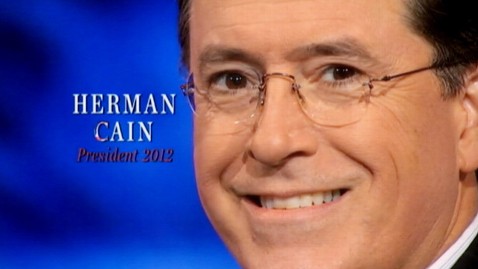The Cain Train Collides With Colbert's Super PAC Satire

Comedy Central/ABC News
The Cain Train has been revived.
Herman Cain, the man who ended his GOP presidential bid with a speech quoting the cartoon Pokémon, has re-fueled his banner-wrapped bus to help a different television character, comedian Stephen Colbert, win the support of South Carolina primary voters.
Colbert, who announced his intention to explore a presidential bid in South Carolina last week, is hosting "The Rock Me Like a Herman Cain: South Cain-olina Primary Rally" on Friday to declare that he and Herman "are the same man."
Because Colbert is not on the South Carolina primary ballot, the Comedy Central comedian has called on Palmetto state voters to pick Cain, whose name still appears on the ballot, in Saturday's primary as a way to determine if there is a "hunger for a Stephen Colbert campaign."
"On Stephen Colbert's endorsement of himself as Herman Cain, I find it very clever and humorous, as it should be," Cain told Fox411. "Anyone who finds what Mr. Colbert is doing offensive, should simply lighten up."
Cain added, "To be perfectly clear, I will not be assuming Stephen Colbert's identity. We are very different when it comes to the color of our - hair."
According to a Marist poll released Thursday, South Carolinians have at least a few pangs of Colbert hunger. About 18 percent of likely GOP primary voters said they were at least "kinda somewhat likely" to vote for Colbert if he chose to run for president.
But just like the announced GOP candidates, Colbert's support has a ceiling, albeit a much lower ceiling. More than half - 56 percent - of South Carolinians polled said they are not likely at all to cast their ballot for the comedian.
The poll was funded by the pro-Colbert Super PAC Americans for a Better Tomorrow, Tomorrow, which Colbert founded in June and turned over to fellow comedian Jon Stewart last week. The Super PAC has been the central theme of Colbert's weeklong presidential posturing.
On both their Comedy Central comedy shows and through four PAC-funded ads running in South Carolina, Colbert and Stewart have spent the week highlighting new campaign finance laws that allow Super PACs to collect unlimited and undisclosed amounts of money from people and corporations and spend that money freely to support political campaigns.
"On the one hand he's just having a good time, but on the other he's engaged in pretty serious satire of the state of campaign finance," said Mark Tompkins, an associate political science professor at the University of South Carolina. "It's more than just fun."
Since Sunday, the pro-Colbert Super PAC has spent $7,600 to run four ads in Charleston, Colbert's home town. The first video spoofs the often truth-twisting nature of Super PAC ads that have dominated the 2012 GOP primary. The second urges voters to vote for Herman Cain as a ballot surrogate for Colbert. The third lambasts the dominance of negative campaign ads.
And the latest episode, which aired for the first time Thursday morning, drops the over-the-top comedy and gets straight to the point.
"Enough is enough," shouts the ad's angry narrator. "I've had it with these money-grubbing Super PACs messing with our Monday to Friday elections."
The ad concludes with the FEC-mandated disclosure spoken by Ben Franklin's talking head on a $100 bill. "Americans for a Better Tomorrow, Tomorrow are responsible for this advertisement."
"The more fun he has … the more he moves the conversation," Tompkins said of Colbert's satirically comedic presidential campaign talk. "After all the real audience for this is the opinion-making elite … people in Washington and leaders in the parties and folks around country who might be disposed to change this."
But, Tompkins pointed out, if Colbert had managed to get his name on the ballot, his joke-coated political posturing may have had real consequences.
"If he was actually on the ballot a bunch of Democrats inclined to make fun of Republicans would show up and vote for him," Tompkins said. "Since he's not … he can do this satire, but it's just satire. It's not disrupting the Republican primary."